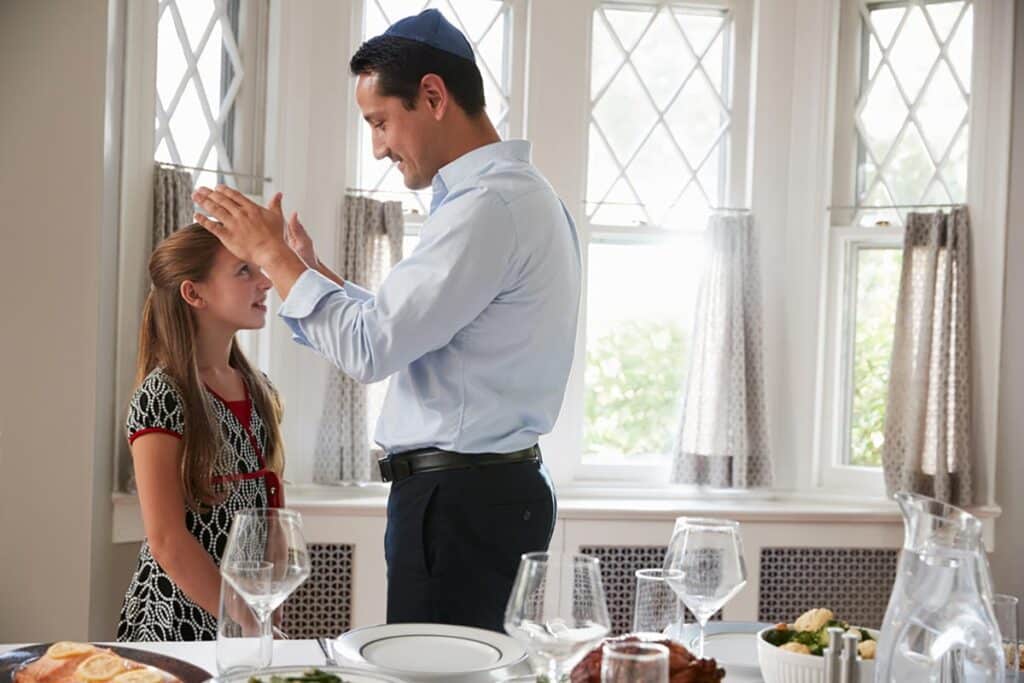When I was about 10 years old, my family took a trip from our home in Ann Arbor, Michigan to visit family friends in Chicago.
We spent Shabbat with them and at dinner on Friday night I witnessed something I had never seen before: the parents of the family placed their hands on the heads of each of their children and blessed them.
While my family had always had Shabbat dinner together and went to synagogue on Saturday morning, this blessing practice — which I came to learn many families did — wasn’t something we did in my family. I asked my parents if we could start, and they were happy to do it.

This practice became part of our Shabbat ritual, a basic part of our week. My dad, in particular, seemed to delight in it — and even many years later, when my brothers and I were grown up and we’d come for a visit, it felt like this opportunity to put his hand on our heads and offer us a blessing was especially powerful for him.
I remember the Shabbat dinner we had in the hospital a few days before he passed away, and how we all knew this was the last Shabbat blessing we would receive from him. It was extraordinarily powerful for all of us.
The practice of blessing children comes from our patriarch Jacob. After recalling how he had experienced God’s blessings when he was younger, Jacob, now in his final days, offers a blessing to his grandchildren, Ephraim and Menashe, the sons of Joseph.
This is probably the most beautiful blessing in the entire Torah. Many different performers have set it to music, and it’s actually a lullaby my wife and I have sung to our kids as we put them to bed. Here’s a translation:
The Holy One, in whose ways my ancestors Abraham and Isaac walked;
the Divine source, who has been my shepherd from the day I was born until this very moment;
the angel who has redeemed me from all harm,
bless these children.
In them may my name be recalled, and the names of my ancestors Abraham and Isaac,
and may they become teeming multitudes upon the earth.
In this magnificently beautiful piece of poetry, our ancestor Jacob models everything a blessing can be: a moment of gratitude for the past and appreciation of the present; a hope for the future.
It’s a moment of beholding how rich and full and abundant this moment can be — this moment that might be carrying pain and suffering, but also carries with it goodness and joy.
It’s what I hope my children have felt when we sang to them at night — and it’s what I know I experienced both in being blessed by my parents and in offering this blessing to my kids.
I think blessings are something many of us don’t relate to all that much. The most frequent blessing many of us encounter daily is after we sneeze when we say ”God bless you,” but we say it almost as a reflex, not with a lot of meaning behind it. Most of us even skip the God part and just say “bless you!”
Yet I think blessings are, at their core, an amazing mindfulness practice — amazing because they operate not only on a personal level, within us, but also on an interpersonal level, between and among us.
What do we do when we offer a blessing? A bunch of things. Blessings express gratitude — awareness of the value of the things and people and experiences in our lives. Blessings can also express goodwill towards other people and the world.
But most essentially, blessings help us tap into a register of life I think many of us have kind of forgotten — a zone where we recognize the world for what it is and can be on a level beyond the surface.
When we offer a blessing, we’re saying, “this food that I’m eating, or this thing that I’m doing, or this person that I’m with, or this experience I’m having — yes, I’m eating or doing or having it, and at the same time, I recognize that it has much deeper roots and much larger branches than I can see and feel right now.”
The rabbis of the Talmud taught that we should strive to recite at least 100 blessings a day. Most of them probably aren’t quite as interpersonal as the blessing parents give their children.
Jewish tradition offers us blessings to say when we put food in our mouths or perform ritual acts, when we light Shabbat candles and when we get up in the morning.
We even have a blessing for after we go to the bathroom. (I mean, seriously — who hasn’t come out of the bathroom sometime and said, “Thank God!”) There are so many opportunities to offer a blessing — whether a blessing of thanksgiving or a blessing of hope.
So this week, my invitation to you is to try to say at least one truly heartfelt blessing every day. You can decide where you want to focus your attention.
Maybe you want to say a blessing of gratitude for your coffee or tea in the morning. Or maybe you want to offer a blessing to a family member or a friend. Maybe you want to offer a blessing to yourself.
Set that intention, and don’t worry about getting the words exactly right. Speak from the heart. And let your blessing come out and bring some light into the world. You probably need it, and the world definitely does.
I say it every week, and I mean it: Blessings for the journey. Know that I’m on it with you.